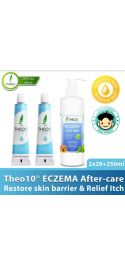
Discover the Brilliant Ingredients That Shield Your Skin from Eczema
On this blog, I am going to talk about the ingredients that are used in the Eczema Cream that benefits the people while they use the product.
Triple Filtered Beeswax
Triple filtered beeswax refers to beeswax that has undergone a process of filtration multiple times to remove impurities and obtain a purer form of beeswax. Beeswax is a natural substance secreted by bees and is commonly used in various industries, including cosmetics, pharmaceuticals, and food.
The process of triple filtering involves passing the beeswax through multiple filters or screens to remove debris, dirt, bee parts, and other impurities that may be present in the raw beeswax. The process of triple filtering beeswax typically involves the following steps:
1. Coarse filtration: The raw beeswax is first melted and passed through a coarse filter or screen to remove larger debris and impurities such as bee parts, wax comb, and other foreign materials.
2. Fine filtration: The filtered beeswax from the coarse filtration step is then further filtered through finer screens or filters to remove smaller particles and impurities, such as pollen, dust, and other contaminants.
3. Microfiltration: In some cases, an additional step of microfiltration may be performed, which involves using even finer filters or screens to achieve a higher level of purity in the beeswax. This step helps to remove even smaller particles and impurities that may have passed through the previous filtration steps.
The goal of triple filtering beeswax is to generate a purer form of beeswax that is suited for a variety of uses, including cosmetic and pharmaceutical compositions where a higher level of purity is needed. A cleaner and more refined product is produced as a result of the triple filtering process, which helps to remove contaminants that may have an impact on the beeswax's quality, appearance, and qualities.
In contrast to raw or barely filtered beeswax, triple filtered beeswax is frequently used in cosmetic and personal care goods including lip balms, lotions, creams, and candles because it is thought to have a greater quality and consistency. It's crucial to remember that the quality and degree of filtration of beeswax can differ according to the producer and the particular use.
Bee propolis
Bee propolis is a natural substance generated from resinous components collected by bees from tree buds, bark, and other botanical sources. Bees use propolis to seal and defend their hives from outside dangers like infections, germs, and fungi.
A complex mixture of different components, including waxes, essential oils, flavonoids, phenols, and other organic and inorganic ones, make up propolis. Propolis composition varies according to geographical location, season, and plant sources available to bees.
Because of its possible health benefits, bee propolis has been utilized for generations in traditional medicine. Antiviral, antibacterial, antifungal, anti-inflammatory, antioxidant, and immunomodulatory activities are believed to exist in it. As a result, it has been used to improve immune function and accelerate wound healing.
In conclusion, bee propolis is a naturally occurring chemical that the bees make and has long been valued for its possible health advantages. It is thought to have antibacterial, antifungal, anti-inflammatory, antioxidant, and immune-boosting activities. It is a complex blend of several chemicals. To completely comprehend its methods of action and possible therapeutic applications, more study is necessary.
Neem seed oil
Neem seed oil is a natural oil derived from the seeds of the neem tree, formally known as Azadirachta indica. The neem tree has been used for generations in traditional Ayurvedic medicine because of its therapeutic benefits. It is native to South Asia, which includes nations like India, Pakistan, and Bangladesh.
The numerous health benefits of neem seed oil are widely recognized and they include:
1. Antimicrobial qualities: Neem seed oil has potent antimicrobial capabilities, making it useful against a wide range of bacteria, viruses, and fungi. It has historically been used to treat wounds, skin infections, and other skin conditions.
2. Anti-inflammatory properties: Neem seed oil has anti-inflammatory qualities that can aid in reducing skin inflammation and redness. As a result, it helps with inflammatory skin diseases like acne, eczema, and others.
3. Antioxidant properties: Neem seed oil has a high concentration of antioxidants, including vitamin E, carotenoids, and other phytochemicals. These compounds work to combat free radicals and shield the skin from oxidative damage brought on by environmental stresses.
Peppermint Essential Oil
The energizing, cooling, and refreshing aroma of peppermint essential oil is well known. It has a strong menthol content, which gives it its distinctive aroma and a cooling effect when applied to the skin or inhaled. Due to its many potential advantages, peppermint essential oil is frequently utilized in aromatherapy, natural treatments, and personal care products. Peppermint oil is a powerful natural treatment for skin conditions like acne, rashes, and bug bites because of its antibacterial and anti-inflammatory characteristics.
Overall, I have explained all the ingredients of the product above that helps people heal eczema.
Powered by Mirasvit Magento 2 Extensions


















